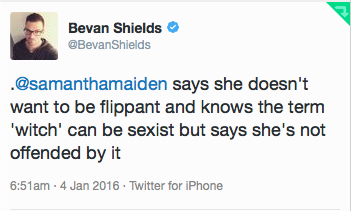 Peter Dutton, a minister of the Crown, accidentally sent a text message to senior Australian journalist Samantha Maiden. The text message referred to Ms Maiden as a ‘mad fucking witch’ for having written an article critical of the behaviour of former minister Jamie Briggs. Mr Dutton publicly owned up to the text. Ms Maiden, while recognising that some would take offence, has graciously indicated that she herself is not offended by the remark. She has accepted Mr Dutton’s apology.
Peter Dutton, a minister of the Crown, accidentally sent a text message to senior Australian journalist Samantha Maiden. The text message referred to Ms Maiden as a ‘mad fucking witch’ for having written an article critical of the behaviour of former minister Jamie Briggs. Mr Dutton publicly owned up to the text. Ms Maiden, while recognising that some would take offence, has graciously indicated that she herself is not offended by the remark. She has accepted Mr Dutton’s apology.

Others maintain that the slur is deeply sexist. So. Is the comment sexist? Or not? At the risk of fence-sitting, I think it’s both. More importantly however, it reveals the hypermasculine, combative mode of parliamentary conduct that is now well past its use-by date.
The yes case
‘Witch’ is a term used to denigrate women. It represents a woman who has outgrown her sexual utility, often imagined as a toothless old crone. It might also represent the threat women pose to patriarchy – through the magicke of their sexual wiles and fertility, the witch stands ready to trap unwary men. The vast majority of those burned as witches were women. That is no accident. It was an effective means of keeping women in their place.
Today, ‘witch’ carries its anti-women history even though many who use the term may not be conscious of it. As a word not used against men, and in light of the negative connotations it carries, use of ‘witch’ is sexist.
Advice to parliamentarians: find a different word without the sexist baggage.
The no case
On the other hand, when I ask myself ‘the woman question’ about Mr Dutton’s response, I ponder if Mr Dutton might have been critical (indeed hostile) towards a man who had written Ms Maiden’s article. I think he would have. He would not have used the word ‘witch’, but a different word that would apply to men.
If we set aside the particular word used, the fact that an insult would likely be leveled equally at a man or woman indicates that the leveling of the insult per se is arguably not sexist.
Advice: refer above.
But that’s not all: The vibe
The words though, occur in a context. And this is what is the underlying or structural problem, beyond the language itself.
Mr Dutton – a party to the cabinet decision to ask Mr Briggs to stand down – made the insult (intending it to go to Mr Briggs) ostensibly in defence Mr Briggs’ behaviour. This is a double standard. On the one hand, as a public official, Mr Dutton was seen to uphold ministerial standards of behaviour that precluded sexual harassment. But behind the scenes, he has condoned a breach of those standards. I don’t even think that it is relevant that the text was intended to be private – the fact is, his behaviour demonstrates a lack of leadership on this issue and a double standard.
Mr Dutton’s actions also point to the combative nature of contemporary politics. I suspect that for many, it is the default hypermasculine response of his personal attack that is so disappointing. The support for Mr Briggs by his confreres as a ‘decent bloke’ similarly reflects the norms of male bonding right at the time parliamentarians are ostensibly (and finally) targeting violence against women. Mr Briggs himself is a White Ribbon Ambassador, whose role includes ‘actively practising and promoting gender equity‘.
Seen as a whole, Mr Briggs’ initial actions, support expressed by his parliamentary colleagues (and in some quarters of the press), Mr Dutton’s framing of his own support, the tenor of public discourse, and the practice of those in power, is a particularly blokey way of doing things.
Advice: Look beyond the platitudes about equality, and respect for women and take a stand. This old-skool behaviour (including the language) has to go.
This post appears also in The Drum, and is the subject of an interview on ABC News Radio.
I so enjoyed reading this piece, Kate. Insightful and thought provoking as ever. I cannot agree with the ‘no’ case, though. Maiden was not merely labeled as a ‘witch’, but as a ‘mad … witch’. Women are often labeled as ‘mad’, ‘crazy’ or ‘hysterical’, when they point out something that men would rather they hadn’t. It does not merely denigrate the woman and dismiss her assertion, it goes to her capacity to make any worthwhile comment at all. In conjunction with ‘witch’, this slur labels the woman as ‘dangerously crazy’. The nature of this description is more than just an insult. And it is gendered. Had Maiden been a man, I am quite sure that the Minister would have used insulting language … But had he called the journalist a ‘prick’ or ‘bastard’, I suspect that the preceding adjective might have been something like ‘stupid’ or ‘dumb’ … Or perhaps something of an emasculating nature … But I doubt that it would have been ‘mad’. ‘Stupid’ and ‘crazy’ are not equivalent slurs. Of course, that is entirely hypothetical. However, as you know, there is a long and sorry history of allegations of mental illness (and threats of such) being used to subjugate and silence women. ‘Gas lighting’ remains a well recognised weapon of psychological abuse. The Minister’s choice of insult occurs in this social context and has a long history.
In short, calling a woman a ‘mad … witch’ is, in my view, highly sexist. More than that … Using that slur to denigrate a woman doing her job as a commentator is to employ The lexicon of misogyny.
This does not merely fall below the standard that we should expect from a minister. It is conduct which indicates unsuitability for that role. And I don’t think that this is altered, either by the fact that this effect may have been unintended or that the woman so described did not feel offended.
LikeLike
Thanks Robyn for your comment. I take your point about ‘mad’ – yes, it is indeed gendered and belittling of women. I had in mind what I’ve heard men say of other men: ‘he’s a mad prick’ usually meaning dangerous, or a loose cannon. A bit of a different connotation but mad nonetheless. So yes, I agree. And the bigger picture is – can we please, please see some self-discipline amongst people who purport to be leaders…what might be called ‘leadership’.
LikeLike
Just came here via the abc website. Really great article to read, thanks for writing Kate.
When I read about international politicians like Trump denigrating women left right and centre, I think I live in a great country by comparison. But just because there is worse across the sea, doesn’t mean we should ignore the sexist comments and misogynist reactions that do occur here. The word witch is very loaded. Commenters defending it by saying that Maiden wasn’t too offended and accepted his apology are missing the point.
The accident Peter Dutton refers to is sending the text to the wrong person, not the actual insult. And as a minister he should know better. He does know better.
LikeLike
Well written, thank you. I have been despairing and expressing my frustration today on Facebook to my friends and colleagues. This article and the one by Paula Mathewson have helped to calm me but I long for other male voices to deplore this kind of behaviour. Particularly from our political leaders. I agree about the term mad in relation to women. Hysterical and emotional are also terms used to undermine women as being other than rational and therefore not threatening.
LikeLike
Pingback: The Ninety-Third Down Under Feminists Carnival | Zero at the Bone